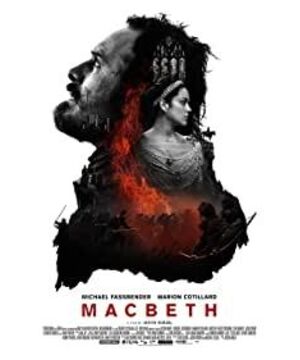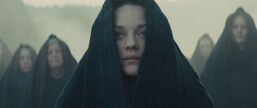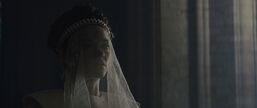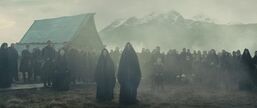"Macbeth" is a work that describes a power struggle, but there is not much intrigue here, and the atmosphere is sombre and restless to make readers/audience feel , the extremely ancient darkness is spreading through the characters, invading a brighter world. It is not a struggle between good and evil, but a struggle between unspeakable chaos (Chaos) and order (Ordnung).
The play/film presents a group of contrasts between chaos and order: the wasteland where Macbeth receives prophecy from the witch and the castles and palaces that symbolize kingship and aristocracy; the witch with supernatural powers between life and death (in the original A woman with a beard, still in between the two genders) and courtiers and nobles who follow the hierarchical order; Macbeth and his wife have no queen, they are considered to be against the social order, and their opponents, King Duncan, General Banquo and Macduff have no One is not a family [Note 1], when Macduff was shocked to hear that the tyrant had executed his wife and children, he shouted "he has no children of his own (...) my lovely chicks and their mothers", which means now Or because, if Macbeth was a father, he probably wouldn't have done such a cruel thing.
Compared with these obvious contrasts of chaos/order, the theme of "destiny" that runs through the whole work is a bit jerky: if "destiny" is not put into the same chain, the tit for tat that Shakespeare painstakingly creates is shaky; If "destiny" is considered as a kind of chaos or order, then is the "destiny" that Macbethin must obey in his death as order or chaos? Wasn't Macbeth a disruptor of social order, how could he try to destroy one order while defending the other?
Is it really "fate" that Macbeth obeys? At the beginning of the play/film, in the king's tent, the sergeant (who appears to be a sergeant in the film) says to King Duncan that Macbeth "doesn't care for the joys and angers of fate" - turns out to be a man who doesn't believe in fate. At the same time, the "prophecies" of the three witches cannot be equated with fate. First, these prophecies themselves are ambiguous, and they do not directly say that "becoming Sir Court" is the premise of "becoming king". Second, "prophecy" and later The events that happened are cause and effect to each other. It is not so much a prophecy that it is the fuse of the monarchy. Third, from Sir Grimes to Sir Court to the king, the rank is getting higher and higher, the power is getting bigger and bigger, This is clearly a portrayal of Macbeth's wish to go to the top step by step, who is not afraid of fate and is ambitious in himself [Note 2]. So I thought that the witch expressed Macbeth's hidden and unknowing wishes in the wasteland, and the "prophecy" that Macbeth believed in was not fate, but the projection of his personal desires. In other words, whatever was in his heart, he was hinted and believed as destiny, which may also explain why Macbeth was devastated and willing to die when he heard that Macduff was born by caesarean section in less than a month: he finally understood that he What he did was not dictated by destiny. He used to think that everything he did was the guidance of the order of destiny. In the end, he found that it was just a personal struggle with no results. Suddenly he realized that the hand that led him in the dark was only his own. hallucinations.
In this way, Macbeth embodies "chaos". But on the other hand, this kind of chaos/chaos—overthrowing the kingship, seizing power (disobedience) is a natural attribute implied in every individual’s human nature, while the social order represented by the feudal hierarchy is artificial. The good and evil of order are not so easy to distinguish. In this sense, Macbeth, who summoned the darkness (the devil in human nature), conformed to the "law of nature", that is, the predatory nature. Conquering, subverting, plundering, these human instincts are united by Macbeth and sexuality in the film to support an individual who unleashes the dark laws that belong to each of us. Here the individual order (or id, id, primordial desire, etc.) competes with the external public order (or superego, super-ego, moral principles). Macbeth thought he followed a mysterious order other than the two, and planned to turn the needs of this mysterious order into the public order of the Kingdom of Scotland. In fact, what he did was to enlarge the individual order and replace the public order.
Therefore, it is clear why Macbeth will fail: the rebel, who is ostensibly seizing the kingship, intends to rule the whole country, is not actually acquiring the kingship of social significance, but the individual achievement of satisfying desire and self-realization .
But he didn't understand.
------------
Note 1: It is worth mentioning that this version of "Macbeth" is the one that emphasizes the element of "children" the most among all the film and television and drama versions I have seen. Not only are the pictures at the beginning and the end of children - the blood descendants of Macbeth at the beginning, and the spiritual descendants who took over his sword at the end - but also on the basis of the original three evil witches, representing another Supernatural Girls, I think these adaptations are very creative.
Note 2: Lady Macbeth herself is a person with no desires. She advises her husband and becomes an accomplice to a murderer, but she never said that she would become a queen. From beginning to end, everything she did was to help Macbeth achieve desire. Therefore, this woman, like the witch on the moor, is meant to reveal the hidden desires in Macbeth's heart.
View more about Macbeth reviews











